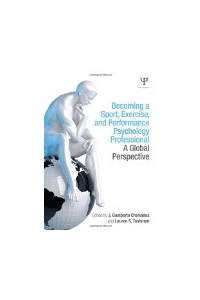“Becoming a Sport, Exercise, and Performance Psychology Professional: A Global Perspective”

“Becoming a Sport, Exercise, and Performance Psychology Professional: A Global Perspective”
Edited by J. Gualberto Cremades and Lauren S. Tashman
Psychology Press, Taylor & Francis
New York, N.Y. 2014
Global perspective is book’s strength
Reviewed by James K. Luiselli, Ed.D., ABPP, BCBA-D
The editors of this book invited colleagues from around the world to write about different aspects of sport, exercise and performance psychology (SEPP). This international focus is impressive, with contributions from professionals around the globe.
At 44 chapters, the book offers an expansive view of SEPP topics that will likely attract a wide albeit select audience.
The book makes it clear that there are many definitions of and labels for SEPP which differ considerably among practitioners and researchers world-wide. These differences emerge from diverse educational systems and training approaches within and between countries. Several chapters in the book discuss strategies to better unify SEPP theory and practice, thereby creating consistent standards that will advance the field.
One large section of the book is devoted to the “Practice of Service Delivery.” The authors of these chapters are both experienced and novice practitioners, who present their training backgrounds, consulting experiences and related career pursuits in SEPP. The chapters cover a broad international landscape that includes Czech Republic, Taiwan, Australia, Denmark, Trinidad and Tobago, to name a few.
Another section of the book addresses training, supervision and mentorship. The authors compare and contrast several methodologies, for example, peer mediated supports and consultation teams, all informed by the respective international perspective. Indeed, there is some common ground but my interest was mostly in the approaches and tactics unique to specific countries.
As a contribution to the literature, this book explains the globalization of the SEPP field, arguing for better integration of definitions, teaching models, practice competencies and certification regulations. The editors have provided a superlative collection of chapters that illustrate cultural and ethnic diversity at its finest. Certain chapters stand out among others but on the whole, the organization of the book is exemplary, not an easy feat considering the depth and breadth of the subject matter.
Also, the book is not a procedural guide. Rather, the editors appear to have given chapter authors wide latitude in writing about their areas of interest and specialization. Similarly, the chapters do not follow a standard format, although most include tables and graphics that summarize key information. However, all of the chapters end with a concluding section, bulleted “take-home messages” and publication references.
I recommend this book to performance psychologists, particularly those with sport and exercise backgrounds. The global perspective is a strength and this theme unites the various topic areas while simultaneously highlighting diversity of populations, policies and practices. The book is not a fast read, is information-dense, but well worth the investment of time and cost if you are interested in what performance professionals are doing around the world.
James K. Luiselli, Ed.D., ABPP, BCBA, is senior vice president, applied research, clinical training and peer review at the May Institute in Norwood, Mass.
Learn more about the book: Becoming a Sport, Exercise, and Performance Psychology Professional: A Global Perspective
